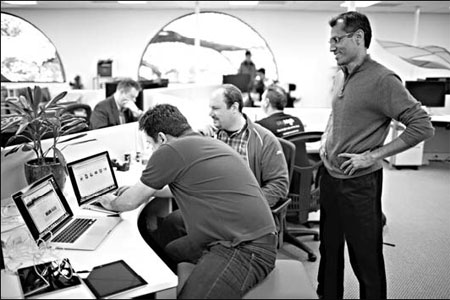Apps and work: data put at risk
Updated: 2013-04-07 07:44
By Quentin Hardy (The New York Times)
|
|||||||||||
|
Rajiv Gupta, chief executive of Skyhigh Networks, right, with engineers at the company's Cupertino, California, headquarters. Peter Dasilva for The New York Times |
SAN FRANCISCO - As is the case with many busy people, Delyn Simons's life has become an open phone app of commingled corporate and personal information.
"I've got Dropbox, Box, YouSendIt, Teambox, Google Drive," says Ms. Simons, a 42-year-old executive, naming some of the services on her iPhone that store memos, spreadsheets, customer information and soccer schedules.
She and her colleagues at Mashery, a 170-employee company that helps other companies build more apps, also share corporate data on GroupMe, Evernote, Skype and Google Hangouts. "From the standpoint of corporate I.T.," she says, "my team is a problem."
While the company's most confidential information is encrypted and available only to authorized executives, John Oberon, Mashery's information technology chief, who is supposed to keep track of company data, said "there's only so much you can do to stop people from forwarding an e-mail or storing a document off a phone."
Once the data leaves the corporate network, protecting it becomes much harder. Searching for the name of almost any large company, plus the word "confidential," yields supposedly secret documents that someone has taken from the company network and published.
Netflix, the streaming video service, recently found employees using 496 smartphone apps, primarily for data storage, communications and collaboration. Cisco Systems, which powers much of the Internet with computer networking gear, found several hundred apps, as well as services for shopping and personal scheduling, touching its own network via employees.
"People are going to bring their own devices, their own data, their own software applications, even their own work groups," drawing off friends and contractors at other companies, said Bill Burns, the director of information technology infrastructure at Netflix. "If you try and implant software that limits an employee's capabilities, you're adding a layer of complexity."
Almost no service is invulnerable. In 2011, Chinese hackers obtained access to hundreds of United States government accounts on Google's Gmail. Last July, Dropbox, one of the most widely used storage services, reported a loss of data from a large number of customers. Without special instructions, customer sales information in the online service of Salesforce.com can be moved to private accounts at Box. Evernote recently said user names, e-mail address and passwords had been stolen in an attack, requiring the passwords of more than 50 million accounts to be reset.
In 2011, Juniper Networks found more than 28,000 samples of mobile malware, mostly for capturing and transferring information like passwords. In January this year, Florida's Juvenile Justice Department reported that 114,538 youth and employee records had disappeared when a storage device with no password was stolen. The state will pay for a year of credit monitoring for everyone whose data was lost.
Last September, a customer notified Rite Aid that he could obtain other customers' names, addresses and prescription records from the company's mobile app. (Rite Aid says the problem has been fixed and that it is not aware of any data loss.)
Even without proof of compromised accounts, such losses can cost a company both money and reputation.
Some apps onto which employees may move company information, like Facebook, are well known. Others, like Remember the Milk, used for completing tasks, are news even to some of the experts in I.T. Skyhigh Networks, which recently started monitoring personal use of apps, has counted more than 1,200 services used in corporate networks from personal devices.
Skyhigh signs up for each service, along with 1,000 others that have not yet touched a corporate network, and researches them for security issues, like how easy it is to get inside the system and obtain another customer's data. The company then tunes a customer's corporate network to allow services to have different degrees of access to information.
"We have to be careful how we inspect for security vulnerabilities, since we don't want to get arrested ourselves," says Rajiv Gupta, Skyhigh's chief executive.
The problem of data leakage is as old as someone taking a carbon copy home on the weekend. What is different now is how people can take data with a finger swipe, and how little they know about whether a service has malware.
Companies do not want to stand in the way of "life splicing," as the intermingling of home and work tasks is known, because it mostly plays in a company's favor. They just want more security.
The New York Times
Today's Top News
Police continue manhunt for 2nd bombing suspect
H7N9 flu transmission studied
8% growth predicted for Q2
Nuke reactor gets foreign contract
First couple on Time's list of most influential
'Green' awareness levels drop in Beijing
Palace Museum spruces up
Trading channels 'need to broaden'
Hot Topics
Lunar probe , China growth forecasts, Emission rules get tougher, China seen through 'colored lens', International board,
Editor's Picks

|

|

|

|

|

|






